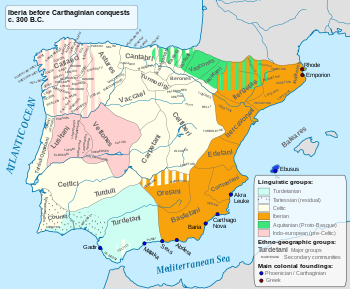The Lusitanians were an Indo-European-speaking people living in the far west of the Iberian Peninsula, in present-day central Portugal and Extremadura and Castilla y Leon of Spain. After its conquest by the Romans, the land was subsequently incorporated as a Roman province named after them (Lusitania).

The Astures or Asturs, also named Astyrs, were the Hispano-Celtic inhabitants of the northwest area of Hispania that now comprises almost the entire modern autonomous community of the Principality of Asturias, the modern province of León, and the northern part of the modern province of Zamora, and eastern Trás os Montes in Portugal. They were a horse-riding highland cattle-raising people who lived in circular huts of stone drywall construction. The Albiones were a major tribe from western Asturias. Isidore of Seville gave an etymology as coming from a river Astura, identified by David Magie as the Órbigo River in the plain of León, and by others as the modern Esla River.

The Turduli Oppidani or Turdulorum Oppida, were a pre-Roman coastal people in present-day Portugal, related to the Turduli Veteres and akin to the Callaeci-Lusitanians.

The Cantabri or Ancient Cantabrians were a pre-Roman people and large tribal federation that lived in the northern coastal region of ancient Iberia in the second half of the first millennium BC. These peoples and their territories were incorporated into the Roman Province of Hispania Tarraconensis in 19 BC, following the Cantabrian Wars.

Hispania Ulterior was a Roman province located in Hispania during the Roman Republic, roughly located in Baetica and in the Guadalquivir valley of modern Spain and extending to all of Lusitania and Gallaecia. Its capital was Corduba.

The Oretani or Oretanii were a pre-Roman ancient Iberian people of the Iberian Peninsula, that lived in northeastern Andalusia, in the upper Baetis (Guadalquivir) river valley, eastern Marianus Mons, and the southern area of present-day La Mancha.

The Lusones were an ancient Celtiberian (Pre-Roman) people of the Iberian Peninsula, who lived in the high Tajuña River valley, northeast of Guadalajara. They were eliminated by the Romans as a significant threat in the end of the 2nd century BC.

The Varduli were a pre-Roman tribe settled in the north of the Iberian Peninsula, in what today is the western region of the Basque Country.

The Autrigones were a pre-Roman tribe that settled in the north of the Iberian Peninsula, in what today is the western Basque Country and northern Burgos and the East of Cantabria, Spain. Their territory limited with the Cantabri territory at west, the Caristii at east, the Berones at the southeast and the Turmodigi at the south. It is discussed whether the Autrigones were Celts, theory supported by the existence of toponyms of Celtic origin, such as Uxama Barca and other with -briga endings and that eventually underwent a Basquisation along with other neighboring tribes such as the Caristii and Varduli.

Cantabrian mythology refers to the myths, teachings and legends of the Cantabri, a pre-Roman Celtic people of the north coastal region of Iberia (Spain). Over time, Cantabrian mythology was likely diluted by Celtic mythology and Roman mythology with some original meanings lost. Later, the ascendancy of Christendom absorbed or ended the pagan rites of Cantabrian, Celtic and Roman mythology leading to a syncretism. Some relics of Cantabrian mythology remain.

The Olcades were an ancient stock-raising pre-Roman people from Hispania, who lived to the west of the Turboletae in the southeastern fringe of the Iberian system mountains.

The Turmodigi were a pre-Roman ancient people, later mixed with the Celts people of northern Spain who occupied the area within the Arlanzón and Arlanza river valleys in the 2nd Iron Age.

The Germani were an obscure pre-Roman ancient people of the Iberian Peninsula which settled around the 4th century BC in western Oretania, an ancient region corresponding to the south of Ciudad Real and the eastern tip of Badajoz provinces.

The Berones were a pre-Roman Celtic people of ancient Spain, although they were not part of the Celtiberians. They lived north of the latter and close to the Cantabrian Conisci in the middle Ebro region between the Tirón and Alhama rivers.

The Pellendones, also designated Pelendones Celtiberorum and Cerindones, were an ancient pre-Roman Celtic people living on the Iberian Peninsula. From the early 4th century BC they inhabited the region near the source of the river Duero in what today is north-central Spain, an area comprising the north of Soria, the southeast of Burgos and the southwest of La Rioja provinces.

The Uraci or Duraci were a little-known Celtic people of pre-Roman Iberia who dwelt to the east of the Vaccaei and the Carpetani, occupying the southern Soria, northern Guadalajara and western Zaragoza provinces since the 4th century BC.

The Allotriges or Allotrigones, were a small 'Celticized' mountain people mentioned alongside the Plentauri by Strabo, as inhabitants of the region roughly corresponding to present-day northwestern La Rioja, around the area of the Ebro sources.

The Iacetani or Jacetani were a pre-Roman people who populated the area north of Aragon (Spain). They settled the Ebro valley, specifically in the area along the Pyrenees. Its capital was Iaca. According to Strabo, their land stretched from the Pyrenees to Lleida and Huesca. It is believed that they could be related to the Aquitanes. They were known to stamp coins. They also appear in the texts of Pliny the Elder and Ptolemy. However, it is likely that some of the ancient sources confuse them with the Lacetani.

Warfare in ancient Iberian Peninsula occupied an important place in historical chronicles, first during the Carthaginian invasion of Hispania, including the Punic Wars, and later during the Roman conquest of the peninsula. The densely bellicose character of the Pre-Roman peoples who inhabited Hispania was repeatedly shown in their conflicts against Rome, Carthage and each other.






